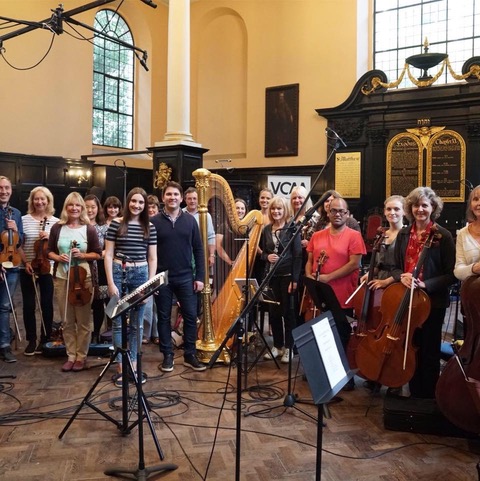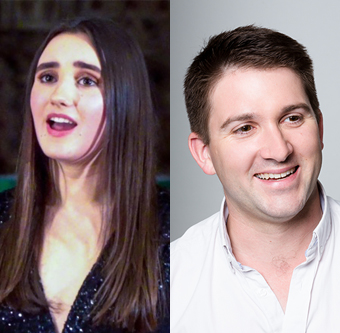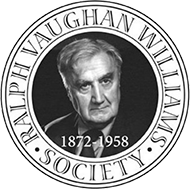‘‘Lost England’
For the first time, Kent Sinfonia brings together works by two important composers on one beautifully arranged CD. The CD, produced in collaboration with Clovelly Recordings at St. Edmund’s Studio, Dover, includes a selection of works by English composers George Butterworth and Walter Leigh. Their music is a reminder of the enormous talent that has been lost to world conflicts.
The title ‘Lost England’ was chosen for the CD, as both composers gave their lives at a young age in defence of their country; Butterworth died at the Somme in 1916, at the age of 31, Leigh near Tobruk in 1942, aged 36. The music of Butterworth is well known, though Leigh’s music is surprisingly rarely performed. This is a unique opportunity to hear both composers in a poignant context that makes them even more engaging.
Music includes: Butterworth: ‘The Banks of Green Willow’, ‘Two English Idylls’; Leigh: ‘Jolly Roger’ overture, Harpsichord Concertino, ‘Squadron 992’, ‘ The Fairy of the Phone’.
The Two English Idylls (1910-11) received their first performance in Oxford in 1912. No 1 is founded on three Sussex folk-tunes: Dabbling in the Dew, Henry Martin and Just as the Tide was Flowing. The second Idyll is based on a single song, again from Sussex, Phoebe and her dark-eyed Sailor.
The Banks of Green Willow was composed in 1913 and first performed the following year. There are three themes: the first – a folksong, The Banks of Green Willow – was collected by Butterworth in June 1907. Later in the piece, the horns introduce an original maestoso theme. The final tune, Green Bushes, had been collected in 1906 in Lincolnshire by Percy Grainger.
Walter Leigh was born in Wimbledon in 1905, the same year as William Alwyn, Constant Lambert, Alan Rawsthorne and Michael Tippett. His first music teacher was his Prussian-born mother, followed by Harold Darke. Leigh’s education continued at University College School, London and Christ’s College, Cambridge where he read English. In 1927 Leigh moved to Berlin where he studied for two years with Hindemith at the Hochschule für Musik. Following a period as musical director of Terence Gray’s Festival Theatre in Cambridge Leigh became a full-time freelance composer.
The BBC quickly spotted his talent, commissioning – inter alia – The Masque of Neptune, the Music for Three Pianos and the 1935 Silver Jubilee concert-overture Agincourt. Leigh’s most successful work was the comic opera Jolly Roger (written with Victor Clinton-Baddeley and Scobie Mackenzie). This ran for six months at London’s Savoy Theatre in 1933 and numbered among its cast Leigh’s sister Charlotte (1907-93) and George Robey, ‘The Prime Minister of Mirth’. The Overture is a separate piece, not related to any specific songs from the show. However, its hornpipe-flavoured, piratical bonhomie sets the scene perfectly, transporting the listener back to the Jamaica of 1690.



The Concertino for Harpsichord and Strings (1934) – dedicated to the German musicologist Hilmar Hockner and his wife – remains Leigh’s best-known concert piece. The middle movement reveals a romantic streak, a contrast to the outer movements’ rumbustious counterpoint.
Like his contemporaries Alwyn and Rawsthorne, Leigh composed prolifically for films, in particular for the GPO and Crown Film Units. Between 1932-40 he penned some twenty scores, including such classics as Pett and Pott (1934), Song of Ceylon (1935) and The Face of Scotland (1938). He made a personal appearance in the 1936 film The Fairy of the Phone, dressed in a ‘loud’ checked suit (complete with plus fours), nursing a cup of tea, attempting to ‘phone his friend ‘Otto Parsnip’. The ‘Fairy’ (played by Charlotte Leigh) is seen at the outset gingerly tip-toeing along the telegraph wire, wearing her telephonist’s headset and brandishing a ’jack’ plug. Various scenes unfold. “Just telephone and we will put you through”, trill the lovely young telephonists at the exchange. An old bearded man then struggles to find a telephone number in his decrepit directories. After a quick waltz a chorale-like passage (complete with ‘wrong’ notes) leads into a jolly 6/8 march. A fire breaks out in the old man’s study. He dials 999 and the fire brigade is there in an instant. “Why not make a trunk call to your continental friends?”, suggests the Fairy. With a snake-charming oboe weaving orientally over a piano drone, we see an Indian prince (played by Clinton-Baddeley) with his nubile attendants. Finally the full company returns for the Grand Finale in an extended version of the earlier Telephone Song.
Leigh’s final film score Squadron 992 is one of his finest. It recounts the saga of a barrage balloon squadron’s deployment from Cardington in Bedfordshire to Scotland to defend the Forth Rail Bridge. Lionel Gamlin’s plummy narration explains that the barrage balloon looks ‘like an elephant that’s had bad news’. The opening fanfare leads into the tuba’s theme which represents the balloons floating in their giant sheds. Some luscious scoring leads into a ‘Scottish’ theme (for flute, harp and strings, which will return later when the convoy reaches Edinburgh). A two-step march evolves into the Squaddie’s song Bless ‘em all. Leigh evokes the weariness of the troops (who have driven through the night up the Great North Road) by turning Bless ‘em all into a parody waltz. Once the Firth of Forth has been reached all hands get to work as the balloons are hauled down, inflated with hydrogen!, winched and braced ‘ready for action’.
Squadron 992’s release coincided with the Dunkirk debâcle and its impact was lost somewhat during the Battle of Britain. In January 1941 Leigh joined the Royal Armoured Corps. Following intensive training on Salisbury Plain he sailed with his tank crew for North Africa. He was killed near Tobruk in Libya in June 1942, just short of his thirty-seventh birthday, leaving a widow, Marion, and three children under the age of eight, Julian, Veronica and Andrew, who had gone to Canada in 1940 to escape the London blitz.
Notes © 2007 by Malcolm Riley.
Preparing Leigh’s Film Scores
As is the case with most film scores, some editing and reshaping is needed to make a viable concert version. The British Library’s Manuscript Collection contains the original parts of The Fairy of the Phone apart from various sections for the piano. These have been filled in by Malcolm Riley with reference to the film soundtrack. For Squadron 992 a much larger reconstruction has been necessary. The BL contains only a few fragments (in short score), including Bless ‘em all and some linking passages. The bulk of the score has had to be transcribed from the monaural soundtrack which, it was discovered, was running a semitone sharp! Just one bar has been ‘composed’, to allow a seamless join into the reprise of the ‘Scottish’ theme.
Katie Marshall
Katie is an award winning 16 year old Soprano. She performed with Julian Ovenden on the Downton Abbey Christmas CD. She was one of only two Classical Singers in the U.K. to get through to the final of “The Next Brit Thing” at the O2 in London.
She ha performed as a Soloist on Tour with BGT’s Jonathan Antoine, G4’s Christmas & UK Tour & André Rieu’s Soprano, Mirusia Louwerse’s Tour in the Netherlands.
Click here to view the video on YouTube
Album – Voice Divine
An Album of arias, sacred and musical theatre songs was produced by VOCES8 musical director who also recorded Katie’s self-titled EP. The album was recorded in London with the Kent Sinfonia Orchestra and was mastered at Abbey Road Studios by Simon Gibson. Katie is in good company as Simon Gibson has also remastered the complete studio recordings of Maria Callas.
Katie’s first EP was recorded in 2014 accompanied by the British Film Orchestra. Barnaby Smith from VOCES8 was the producer and it was mastered by the award winning Simon Gibson at Abbey Road Studios. John Brunning (Classic FM Drive) sent over the score of his Pie Jesu for her to sing and a duet version was also recorded with the Grammy award winning artist, Paul Phoenix from the King’s Singers. The original song called ‘Per Aspera’ was composed by both Katie and the composer Andrew Jones.

CD recording day with Katie Marshall and Barnaby Smith (VOCES 8) – Gresham Centre, London

Royal Throne of Kings
Our new recording with The Ralph Vaughan Williams Society and Albion Records; more information and reviews on News/Recordings pages).
Ralph Vaughan Williams loved Shakespeare, and it inspired his music throughout his long composing career. ALBD062 Royal Throne of Kings is a collection of some of that music.
This Shakespeare album has been many years in planning and preparation and has been generously supported by the Vaughan Williams Foundation and by many of our members and supporters.
In 1912 and 1913 Vaughan Williams composed and conducted music for Shakespeare plays in the Memorial Theatre at Stratford-upon-Avon, where Sir Frank Benson presented plays for many years. He composed some new music, but preferred
to use music of Shakespeare’s own time whenever possible. The album includes a Henry IV Suite assembled from the surviving cues by Malcolm Riley, and a Stratford Suite, put together from a number of plays by Nathaniel Lew.
Vaughan Williams wrote a Henry V Overture in 1913, many years before developing the material into a new work for brass with the same title – David Owen Norris was able to reconstruct the lost 1913 score from the orchestral parts.
Nathaniel Lew has arranged a Richard II Concert Fantasy, using incidental music commissioned from Vaughan Williams by the BBC in 1944 but not used at the time.
Other arrangements include Muir Mathiesons’s Two Shakespeare Sketches from The England of Elizabeth, Malcolm Riley’s arrangement of Dirge for Fidele, and RVW’s 1913 treatment of Greensleeves.
The orchestral music is played by Kent Sinfonia, conducted by James Ross. The recital is broken up by five settings by Vaughan Williams of words found in Shakespeare’s plays, sung here by soprano Eloise Irving, accompanied by Malcolm Riley on the piano.
(from John Francis, Chairman, Ralph Vaughan Williams Society)

